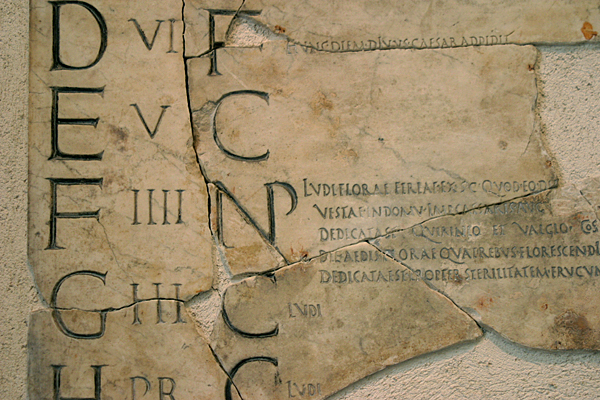|
|
 发表于 2009-2-15 06:50:21
|
显示全部楼层
发表于 2009-2-15 06:50:21
|
显示全部楼层
http://penelope.uchicago.edu/~grout/encyclopaedia_romana/calendar/floralia.html
  Return to Julian Calendar
  Floralia
  
[blockquote][blockquote][blockquote][blockquote][blockquote][blockquote][blockquote]              "You start in April and cross to the time of May
              One has you as it leaves, one as it comes
              Since the edges of these months are yours and defer
              To you, either of them suits your praises.
              The Circus continues and the theatre's lauded palm,
              Let this song, too, join the Circus spectacle."[blockquote] Ovid, Fasti (V.185-190) [/blockquote][/blockquote][/blockquote][/blockquote][/blockquote][/blockquote][/blockquote]In238BC, at the direction of an oracle in the Sibylline books, a templewasbuilt to honor Flora, an ancient goddess of flowers andblossomingplants. It was dedicated on April 28 and the FloraliaNatural History,XVIII.286,cf. Velleius Paterculus, I.14.8, who says 241/240 BC).Sometime later,the festival was discontinued, only to be revived in173 BC, when theblossoms again that year suffered from winds, hail,and rain (Ovid, Fasti,  V.329ff). It was celebrated annually with games (ludi Florales)fromApril 28 until May 3. These farces and mimes, which receivedofficialrecognition, were known for their licentiousness. Theprostitutes ofRome, who regarded the day as their own, performed nakedin the theaterand, suggests Juvenal (Satire VI), fought in thegladiatorialarena. In the Circus Maximus, deer and hares, symbols offertility, werelet loose in honor of the goddess as protector ofgardens and fields(but not of woods and wild animals) and, instead ofthe customary white,colorful garments were worn during thefestivities, some of which werecelebrated at night (Ovid, Fasti,IV.946, V.189-190, 331ff.).Chickpeas (garbanzo beans, another symbolof fertility) also were thrownto the people in the Circus (Persius, Satires,  V.177ff).
  Valerius Maximus (II.10.8) relates that it was the custom  at theatrical presentations during the Floralia forthespectators to demand that the actresses perform naked on stage.Ratherthan interfere with the festivities, Cato (the Younger), who wasinattendance, walked out. The audience followed him, applauding thefactthat, although disgusted and embarrassed, Cato choose to leaveratherthan have his presence inhibit the performance. They then wentbackinside. Certainly, the bawdy celebration offended Cato, who isquoted byAulus Gellius (Attic  Nights, X.13) as saying that aparticipantacted like a harlot, going from the banquet straight to thecouch, whereshe disported herself with others. Martial is not soforgiving of suchhypocritical morality, declaring in the preface tohis first book ofepigrams that they are written for those who areaccustomed to watchingthe Floralia, not for the likes of Cato,who cannot be so naiveas not to have known what to expect when hechoose to attend "sprightlyFlora's ritual fun, the festal jests andlicense of the rout." Thefourth-century poet, Ausonius, is equallyimpatient with such behaviorwhen he chides those who go to the theaterduring the Floralia--"the rites  which they long to see who declare they never longed to see them"  (Eclogues, XXIII.25).
Writingin the decade after the Diocletian persecution (AD 303),Lactantius, ayounger contemporary of Valerius, has his own notion asto the originsof the festival. instituted to solicit her protection  (Pliny, [blockquote]"Flora, having obtained great wealth bythis practice [harlotry], madethe people her heir, and left a fixed sumof money, from the annualproceeds of which her birthday might becelebrated by public games,which they called Floralia. And because thisappeared disgraceful tothe senate, in order that a kind of dignitymight be given to ashameful matter, they resolved that an argumentshould be taken fromthe name itself. They pretended that she was thegoddess who presidesover flowers, and that she must be appeased, thatthe crops, togetherwith the trees or vines, might produce a good andabundant blossom. Thepoet [Ovid]followedup this idea in his Fasti, and related that there was a nymph,by nomeans obscure, who was called Chloris, and that, on her marriagewithZephyrus, she received from her husband as a wedding gift thecontrolover all flowers. These things are spoken with propriety, butto believethem is unbecoming and shameful. And when the truth is inquestion,ought disguises of this kind to deceive us? Those games,therefore, arecelebrated with all wantonness, as is suitable to thememory of aharlot. For besides licentiousness of words, in which alllewdness ispoured forth, women are also stripped of their garments atthe demand ofthe people, and then perform the office of mimeplayers,and are detainedin the sight of the people with indecent gestures,even to the satiatingof unchaste eyes."
    Divinæ Institutiones (I.20) [/blockquote]Indeed,Lactantiusrelates the same story of Larentia (Larentina), the wife ofFaustulus,who had found Romulus and Remus, to explain the origin ofanother Romanfestival, the Larentinalia  on December 23.
A centurylater, Augustine also criticized the celebration of Flora,questioningwhy it should be "more satisfactory to irritate the gods bytemperance,than to pacify them by debauchery; and to provoke theirhate by honestliving, than soothe it by such unseemly debauchery" (De Civitate Die, II.27).  To which the goddess doubtless would have replied: "use  life's beauty as it blooms" (Fasti, V.353).
      A Dutch expatriate living in England, Sir  Lawrence Alma Tadema(1836-1912)began to paint the imagined world of classical Greece andRome after avisit to Pompeii in 1863. His languid, often sensuous,figures foundacceptance in Victorian society because of theirclassical setting.
      Two notes: Ovid speaks of rabbits and capreaebeingreleased in the Circus. The word is the plural for "roe deer,"but"goats" has been given in translation as well and, indeed, that istheancient name for the isle of Capri, where goats were found. Yet,theplural of a female goat is caprae and, presumably, there isanetymological association that allows translators of the passage tooffertwo different meanings for the word.
  Whereas Pliny is quite specific as to the date of the Floralia,whichwas instituted in 516 AUC (238 BC), the date provided byVelleiusPaterculus must be calculated, which may explain why both 241BC and240 BC are given. The Oxford Classical Dictionary  says simply 240-1 BC.
      The detail above is from the Fasti Praenestini, which  is in the Palazzo Massimo Alle Terme (Rome), and pertains to  April 26-30. For April 28, one can read Eodem die aedes, quae  rebus florescendis praeest, dedicata est propter strilitatem  frugum.
      References: Pliny: Natural History (1938-) translated  by H. Rackham et al. (Loeb Classical Library); Ovid: Fasti  (2000) translated by A. J. Boyle and R. D. Woodard (Penguin Classics);  Varlerius Maximus: Memorial Doings and Sayings (2000)  translated by D. R. Shackleton Bailey (Loeb Classical Library);  Velleius Paterculus: Compendium of Roman History (1924)  translated by Frederick W. Shipley (Loeb Classical Library);  Martial: EpigramsJuvenal and Persius (1918) translated  by G. G. Ramsay (Loeb Classical Library); Ausonius (1919)  translated by Hugh G. Evelyn-White (Loeb Classical Library);  A Select Library of Nicene and Post-Nicene Fathers of the  Christian Church, Series II (Vol VII: Lactantius) (1890-1896)  edited by by Philip Schaff and Henry Wace; A Select Library  of Nicene and Post-Nicene Fathers of the Christian Church, Series  I (Vol II: Augustine) (1898) edited by by Philip Schaff and  Henry Wace; Alma Tadema's Spring (1978) by Burton B. Fredericksen  (J. Paul Getty Museum).
(1968) translated by Walter C. A. Ker  (Loeb Classical Library); [/blockquote]Return to Top of Page
      
http://en.wikipedia.org/wiki/Flora_(goddess)
Flora (mythology)
                     From Wikipedia, the free encyclopedia
              (Redirected from Flora (goddess))
                                    Jump to: navigation, search
                           Topics in Roman mythology  Important Gods:        Legendary History  Roman religion        Greek/Roman myth compared  —  Other Rustic Gods:        In Roman mythology, Flora was a goddess of flowers and the season of spring. While she was otherwise a relatively minor figure in Roman mythology, being one among several fertility goddesses, her association with the spring gave her particular importance at the coming of springtime. Her festival, the Floralia,was held in April or early May and symbolized the renewal of the cycleof life, marked with dancing, drinking, and flowers. Her Greek equivalent was Chloris. Flora was married to Favonius, the wind god, and her companion was Hercules. Due to her association with plants, her name in modern English also means plant life.
Flora achieved more prominence in the neo-pagan revival of Antiquity among Renaissance humanists than she had ever enjoyed in ancient Rome.
One of the fairies in the Sleeping Beauty (1959 film) is named Flora after this goddess.
[edit] References
[li]Ovid, Fasti V.193-212[/li][li]Macrobius, Saturnalia I.10.11-14[/li][li]Lactantius, Divinae institutions I.20.6-10[/li]
      [url=http://en.wikipedia.org/wiki/File ebr024.jpg] ebr024.jpg] [/url] [/url]
  Flora or Hebe Marie Louise Élisabeth Vigée-Lebrun
    [url=http://en.wikipedia.org/wiki/File ._Abbema_Flora.jpg] ._Abbema_Flora.jpg] [/url] [/url]
  Flora Louise Abbéma 1913
    
  Goddess Flora depiction Rembrandt van Rijn, 1634
    
  Portrait of Flora Rembrandt van Rijn, 1635
      
  Detail of Flora from Primavera by Botticelli, c. 1482
       Wikimedia Commons has media related to: Flora  Wikimedia Commons has media related to: Flora 
[edit] External links
      Retrieved from "http://en.wikipedia.org/wiki/Flora_(mythology)"
            Categories: Roman goddesses | Fertility goddesses | Spring | Nature goddesses
http://zh.wikipedia.org/wiki/%E4%BD%9B%E6%B4%9B%E6%8B%89
佛洛拉
                     维基百科,自由的百科全书
                                                 跳转到: 导航, 搜索
                               
佛洛拉
佛洛拉(拉丁语:Flora)罗马神话中司花朵、青春与欢乐的女神。
在罗马神话中,佛洛拉是西风之神仄费罗斯的情人,后者给了她掌管花朵和青春永驻的权利。纪念她的节日是每年的4月28日至5月3日。在古罗马时代,该节日的仪式非常盛大,包括举行竞技活动。[1]在古典时代的艺术作品中,佛洛拉的形象通常是一个与鲜花相伴的少女。
佛洛拉在希腊神话中的对应者是克洛里斯(春天与花朵的女神)。
小行星花神星‎的名字来自佛洛拉。
[编辑] 注释
[编辑] 资料来源
  
相關的维基共享资源: 佛洛拉
      来自“http://zh.wikipedia.org/wiki/%E4%BD%9B%E6%B4%9B%E6%8B%89”
            分类: 羅馬神祇 | 女神 |
|